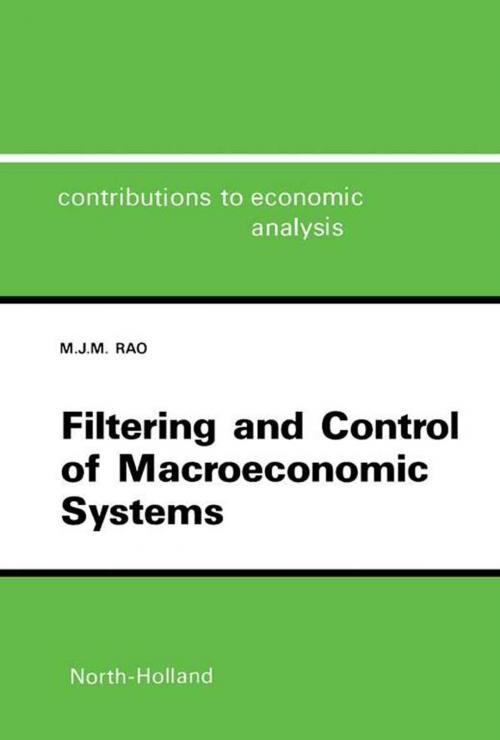Filtering and Control of Macroeconomic Systems
A Control System Incorporating the Kalman Filter for the Indian Economy
Business & Finance, Economics, Econometrics, Theory of Economics| Author: | M.J.M. Rao | ISBN: | 9781483290072 |
| Publisher: | Elsevier Science | Publication: | October 22, 2013 |
| Imprint: | North Holland | Language: | English |
| Author: | M.J.M. Rao |
| ISBN: | 9781483290072 |
| Publisher: | Elsevier Science |
| Publication: | October 22, 2013 |
| Imprint: | North Holland |
| Language: | English |
Advances in computer technology, coupled with the sophistication of econometric modelling, have enabled rapid progress in the formulation and solution of optimal control and filtering programmes, especially in the sphere of macroeconomic policy designing.
These developments in systems methodology have prompted the need for an interface between optimal control theory and dynamic macroeconomic analysis. The implications of this convergence have already aroused a great deal of research, but it remains to be seen whether policy makers in most developing countries will consider actually incorporating these techniques into planning. The author argues that control and systems theory can be of immense help in stabilizing those economies plagued by cyclical and structural problems. By demonstrating the applicability of control & filter theory to short-term macroeconomic planning, this book illuminates the impressive array of problems that can thereby be solved, and helps foster a closer working relationship between economists and control theorists.
The work deals specifically with the construction of a Kalman filter mechanism, for deriving short-term optimal economic policies under conditions of uncertainty. It specifies and resolves a macroeconometric model which is linked to a unique observation sub-system of a given economy, congruent with the errors in information signalling which are prevalent within the data base context of most developing countries. An evaluation of control settings contrasts short and long-term economic policies. This indicates that an economy may `overheat' under protracted settings of instrument values around their optimal levels if the constraints on the system, in the form of external shocks, are too great to allow reaching all targets simultaneously using feasible instrument paths.
Advances in computer technology, coupled with the sophistication of econometric modelling, have enabled rapid progress in the formulation and solution of optimal control and filtering programmes, especially in the sphere of macroeconomic policy designing.
These developments in systems methodology have prompted the need for an interface between optimal control theory and dynamic macroeconomic analysis. The implications of this convergence have already aroused a great deal of research, but it remains to be seen whether policy makers in most developing countries will consider actually incorporating these techniques into planning. The author argues that control and systems theory can be of immense help in stabilizing those economies plagued by cyclical and structural problems. By demonstrating the applicability of control & filter theory to short-term macroeconomic planning, this book illuminates the impressive array of problems that can thereby be solved, and helps foster a closer working relationship between economists and control theorists.
The work deals specifically with the construction of a Kalman filter mechanism, for deriving short-term optimal economic policies under conditions of uncertainty. It specifies and resolves a macroeconometric model which is linked to a unique observation sub-system of a given economy, congruent with the errors in information signalling which are prevalent within the data base context of most developing countries. An evaluation of control settings contrasts short and long-term economic policies. This indicates that an economy may `overheat' under protracted settings of instrument values around their optimal levels if the constraints on the system, in the form of external shocks, are too great to allow reaching all targets simultaneously using feasible instrument paths.















